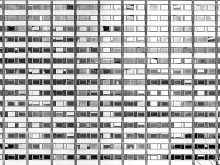Whenever the term 'Stuttgarter Schule' comes up in discours, different disciplines refer to it in different ways. Cultural scientists and computer scientists remember the time when cyberneticist Max Bense lectured on the philosophy of technology at this very university. Architects and architectural historians, however, think of various instances of 'Das Neue Bauen': the time when not only Theodor Fischer taught in Stuttgart, but also his disciples Paul Bonatz and Paul Schmitthenner, who in the 1920s and 30s were representing the 'Modern Moderates'. By the same token, the period of Reconstruction following World War II claims the title 'Stuttgarter Schule', a period during which Richard Döcker championed the resuscitation of the modern movement once ousted by the nazis. Similarily, the period immediately following the Reconstruction, which was defined by Frei Otto and its mandate of intelligent construction, is being coined 'Stuttgarter Schule'.
However, yet another period is being referred to as 'Stuttgarter Schule': in the early 1970s, the K1 building set the stage for a radical experiment of a school without teachers. In the wake of the political upheaval of '68, students self-organized seminars, studios and exams, debated about politics and models of political participation; the social relevance of architecture, as well as the reform of education and design methodology; they printed pamphlets and founded periodicals. The most prominent product of this period still influencing the architectural discours in Germany to this day, is ARCH+.
The seminar focusses on research and analysis of the Forgotten 'Stuttgarter Schule'. In addition, we will expand the central question of our department's Stuttgart-Initiative "What are we to design?" by asking "How are we to design"? Its aim is to initiate a new debate about the form and content of education at our department, relating to the current, crucial, cultural, and political debates in society.


